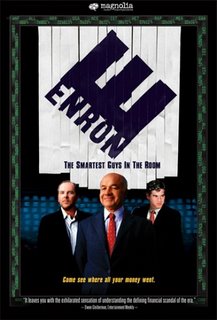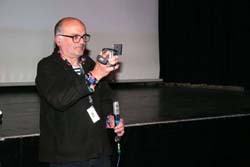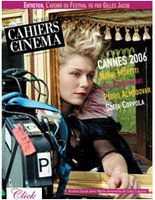
Tuesday, May 30, 2006
DOC'S KINGDOM presents this year's programme
Festival site.
Ken Loach wins the Palme d'Or at the Cannes Film Festival
Read more +
Sunday, May 28, 2006
Friday, May 26, 2006
Mixed media
 Sensorial overloads, low-key video narratives, global trotting collages and art world stars were some of the attractions of the protean programme of the Osnabrück Media Art Festival in Germany's Lower Saxony region. Last week the festival arrived at its 19th edition. As one of the main media art events in the world, it is a barometer and a survey of what's happening in the increasingly hybrid world of moving images. This year's slogan was Smart Art, which according to the programme notes translated into works that "question social conventions, take familiar things out of their context and subtly track down the absurdities of individual and social everyday life." There certainly was a lot of that as well as a great deal of not that, but you can't blame the organisers for trying to wrap up with some kind of thematiccoherence a sprawling programme that included experimental shorts and videos in a wide range of forms and aesthetics, space-oriented installations (which will run until 18 June), multimedia live performances and other events of expanded cinema, a congress on theoretical discourses about current media art and an international student forum.
Sensorial overloads, low-key video narratives, global trotting collages and art world stars were some of the attractions of the protean programme of the Osnabrück Media Art Festival in Germany's Lower Saxony region. Last week the festival arrived at its 19th edition. As one of the main media art events in the world, it is a barometer and a survey of what's happening in the increasingly hybrid world of moving images. This year's slogan was Smart Art, which according to the programme notes translated into works that "question social conventions, take familiar things out of their context and subtly track down the absurdities of individual and social everyday life." There certainly was a lot of that as well as a great deal of not that, but you can't blame the organisers for trying to wrap up with some kind of thematiccoherence a sprawling programme that included experimental shorts and videos in a wide range of forms and aesthetics, space-oriented installations (which will run until 18 June), multimedia live performances and other events of expanded cinema, a congress on theoretical discourses about current media art and an international student forum.What is really smart in the case of Osnabrück is the avoidance of the terms 'film' and 'video' to favour the expression 'media', which gives the curators and organisers more freedom to bring together different work practices and thus foment a dialogue between practitioners who pursue different visual languages. It also creates an environment where conventional narrative gives way to new forms of storytelling and to works whose artistic ambition is more Dada than Hollywood.
Since the festival calendar included simultaneous events, it was impossible to see everything. So the bewildered spectator had to look at the programme as a vast pool where they could jump in at leisure and come out of it with an idea of the whole. From what I saw I noticed a tendency by some artists to break international barriers in collage-oriented pieces, weaving together footage captured in different places and countries, a tendency which seems to signal how geographical borders have disappeared from their creative minds. Mixed media was also big on the agenda, and many works I saw were hybrid, contaminated artifacts, happily juxtaposing different visual languages and media in carnivalesque symbiosis. Cases of low-key video narratives were also to be found and one particularly good work that lept to my attention was the British feature Stella Polare by Andrea Kennedy and Ian Wiblin, a flâneuristic meditation on dislocation and the metaphysical lingering of history. The war was also present but mercifully works intended as piss-takes of Bushisms were thin on the ground. The few cases that alluded to Iraq, Bush and what passes as 'political statements' these days (often based on what people see in the media rather than real knowledge) were typically sub-Michael Moore standard and offered no new angles.
I wish I could say I had a whale of a time with Matthew Barney's new film Drawing Restraint 9 starring himself and his wife Björk. An incursion into Japanese iconography, the film starts off with lush, beautifuly shot imagery and gradually (actually, very gradually) moves towards the sequences when Barney and Björk perform a strange laceration ritual on board of a Japanese whaling ship where they have been invited to as 'occidental guests'. Barney became famous for his Cremaster series and he is nothing short of an art world superstar. But with this film he teeters seriously close to Peter Greenaway's neo-baroque territory. The programme notes informed us that Björk was reluctant to make another film after her famously traumatic film experience with Lars Von Trier in Dancer in the Dark, but Barney persuaded her to be in the film as well as compose a soundtrack for it, which alternates between moments of sheer beauty and New Age ridiculousness. Drawing Constraint 9 is often a stunning film with superb photography, but perfunctorily ruined when Barney and Björk take over the screen. Björk is uncomfortable (as anyone would be with all that gear on) and Barney's performance is weak. Their screen coupling is a case of narcissism getting in the way of art. Quite a few people walked out of the screening, stupefied with tedium, and when the lights finally came on (after what seemed like four hours - it's two hours and fifteen minutes long, quite a stretch for a non-narrative film), people were gazing at each other as if to confirm everyone else was feeling the same.
But to finish this piece on a positive note, I couldn't recommend more John & Jane, Ashim Ahluwalia's confident second feature about call centres in Bombay and which won the he dialogue prize of the Foreign Office in Osnabrück. Although it sounds like one of those documentaries about corporations and globalisation coming out of Robert Greenwald's film factory, this is much more sophisiticated than that. Ahluwalia blends the distanciation of observational documentary with hints of sci-fi to blur fiction and verity as he delves into the lives of six call centre workers whose lives lie somewhere between the real and the virtual. The tense, pulsing electronic soundtrack enhances the dystopic futuristic feel of the film while a disturbing, Ballardian picture of globalisation emerges on the screen. With John & Jane (a reference to the names of the average American) Ahluwalia has cemented his place as a key figure in non-Bollywood cinema (he's the founder of Future East pictures, the production company behind this title) and hopefully his work will get the attention it deserves.
Enron former execs found guilty
 While the film Enron: The Smartest Guys In The Room has been doing really well in the UK - it took £37,746 on just six screens when it opened on 28 April - former chief executive Jeffrey Skilling and founder Kenneth Lay have been found guilty of conspiracy and fraud following the 15-week trial which involved a total of 54 witnesses and a jury of eight women and four men.
While the film Enron: The Smartest Guys In The Room has been doing really well in the UK - it took £37,746 on just six screens when it opened on 28 April - former chief executive Jeffrey Skilling and founder Kenneth Lay have been found guilty of conspiracy and fraud following the 15-week trial which involved a total of 54 witnesses and a jury of eight women and four men.The decision came after six days of deliberations, with Kenneth Lay proved to be guilty on all six of his charges and Jeff Skilling found guilty on 19 of the 26 charges he faced. The former executives have been found guilty of misleading the public about the true financial health of Enron, which has become one of the biggest business scandals in American history and has sent shockwaves through corporate boardrooms worldwide.
The documentary feature Enron: The Smartest Guys In The Room, which received an Oscar nomination this year, is still playing round the country. The film is based on the best-selling book The Smartest Guys in the Room by Fortune reporters Bethany McLean and Peter Elkind and features insider accounts and corporate audio and videotapes.
Film site.
Monday, May 22, 2006
Bergman site now available in English
Ingmar Bergman Face to Face is the world's largest multi-media collection showcasing Ingmar Bergman's professional career, which dates back to 1938. The site holds thousands of stills, video clips and newly-written texts. It also covers his less well-known radio plays, theatre and opera productions, as well as his books and essays.
Launched last September, the Swedish version of the website was voted the 2005 Swedish Cultural Web Site of the year. This year the website has also won awards for its content and design.
In 2001 Bergman donated his collected archives to the Swedish Film Institute. Following the donation, the Film Institute, in partnership with the Royal Dramatic Theatre, Svensk Filmindustri and Sveriges Television, founded the Ingmar Bergman Foundation, the initiator of the website.
Visit the site +
Da Vinci Code slated at Cannes film festival
Full story +
Saturday, May 20, 2006
Kenneth Anger in Bremen
 Those who happen to be visiting the German town of Bremen until 25 June (as you do) should take the opportunity to see a show of Kenneth Anger's films at the Künstlerhaus Bremen under the title Pleased to Meet You (ed: a reference to the Stones' Sympathy for the Devil, which rock and roll legend says was inspired by Mr Anger).
Those who happen to be visiting the German town of Bremen until 25 June (as you do) should take the opportunity to see a show of Kenneth Anger's films at the Künstlerhaus Bremen under the title Pleased to Meet You (ed: a reference to the Stones' Sympathy for the Devil, which rock and roll legend says was inspired by Mr Anger).The text that accompanies the show gives us a brief introduction to Mr Anger's life and times:
"At the Festival du Film Maudit in Biarritz in 1949 a group of young cinéastes came together. With their challenge to established cinema, they incorporated the new generation, the later Nouvelle Vague. The winner of the festival in the category Poetic Film was the 19-year-old American Kenneth Anger with his film Fireworks. One weekend in 1947 – Mr. and Mrs. Anger had gone to a funeral – 17-year-old Kenneth had availed himself of the opportunity and made an experimental film in his parents' apartment; it was to become a milestone in the history of the genre. While the Nouvelle Vague attempted to oppose the bourgeois traditions of the cinema, Anger's films constituted a critique of the dream factory Hollywood. He had his own, very different approach to collective dreams, myths and desire. Anger's films are not narrative, they present images of magic rituals in which each sign points to some unknown transcendence. The heightened sensuality resulting from the intensely opulent colours and the way individual images are blended imbue these films with a baroque splendour. Anger's technique of linking image and sound and his borrowings from popular culture were formative and would later impact the genre of the music video. Anger inspired the Rolling Stones to their hit song Sympathy for the Devil and greatly influenced film directors such as David Lynch, Donald Cammell, Roger Corman, R. W. Fassbinder and Martin Scorsese, who called Anger “an artist of exceptional imagination”."
This exhibition of Kenneth Anger's oeuvre at the Künstlerhaus Bremen is his first solo exhibition in Germany.
Friday, May 12, 2006
German film auteur Wilhelm Hein visits London
 A major figure of European personal filmmaking, Wilhelm Hein makes a rare visit to London this month to present three programmes of his films. WILHELM HEIN: PERFEKT! starts at The Horse Hospital on 19 May with a screening of Hein’s latest film, the open-ended underground opus You Killed The Underground Film, or The Real Meaning of Kunst Bleibt, Bleibt, which gathers footage shot over a decade in a diaristic odyssey that slides from the sublime to the ridiculous, between document and performance.
A major figure of European personal filmmaking, Wilhelm Hein makes a rare visit to London this month to present three programmes of his films. WILHELM HEIN: PERFEKT! starts at The Horse Hospital on 19 May with a screening of Hein’s latest film, the open-ended underground opus You Killed The Underground Film, or The Real Meaning of Kunst Bleibt, Bleibt, which gathers footage shot over a decade in a diaristic odyssey that slides from the sublime to the ridiculous, between document and performance.WILHELM HEIN: PERFEKT! continues with two events at the Goethe-Institut London on 20 May. In the afternoon Wilhelm Hein will join British filmmaker and theorist Malcolm Le Grice to talk about the development and practise of Materialist film in Britain and Germany in the 1960s and 1970s and to present some of their work from this period. In the evening Wilhelm Hein will host a screening of international avant-garde films including works by Andy Warhol, Tony Conrad and the Viennese Actionists Günther Brus and Otto Mühl selected from Hein’s own personal collection.
Wilhelm Hein began filmmaking (together with Birgit Hein) in the late 1960s, creating original collages such as Rohfilm (1968). In these rough, visual attacks, the film material affirms its presence on the screen rather than acting simply as a transparent carrier for photographic images. This style of Materialist filmmaking developed in parallel at the London Filmmakers’ Co-operative, leading to early links between the avant-garde in Germany and the UK. Wilhelm and Birgit Hein were also innovators in the fields of multi-screen projection and live film performances, with works including Doppelprojektion (1971) and Superman and Wonderwoman (1980-84). Tireless promoters of work by others, they organised XSCREEN in Cologne (1968-71) to present regular programming, made documentaries for WDR television, and were largely responsible for establishing a presence for avant-garde cinema in European art museums and surveys (such as Documenta) in the 1970s.
Despite this activity and recognition, Wilhelm Hein has resisted becoming part of the establishment. He remains committed to the vitality of the underground and prefers punk clubs to professorships. A survivor with a restless energy, Hein is one of the last true radicals of his generation, continuing with a subversive practise dedicated to the freedom of expression.
WILHELM HEIN: PERFEKT! (19-20 May) is curated by Mark Webber (former member of pop band Pulp).
More+
Thursday, May 11, 2006
Cannes film festival 2006

Jack Smith revival

Jack Smith and the Destruction of Atlantis screened at the Tribeca film festival which folded last weekend (7/5) and hopefully will be arriving in the UK in the near future.
Meanwhile, the film's website contains clips and all sorts of Flash animations. It also gives the uninitiated a good introduction to Smith's legacy.
Wednesday, May 10, 2006
Cannes lurks again
"Italy, Australia and Romania are the hotbeds of world cinema, with Spain and Mexico not far behind, while Middle Eastern and Asian movies have lost their luster. That is, of course, if you believe the films chosen to screen at next week's Cannes Film Festival can be taken as a sign of cinematic prosperity."
Full article +
Tuesday, May 09, 2006
The Filter goes to Germany
 I'll be attending the EMAF, Europe's leading media art festival, which starts tomorrow in the town of Osnabrück in Germany, as a media guest and exhibitor. As I said in a previoous post, my video 'Job Interview' was selected for this year's programme. I'll be filing a dispatch early next week.
I'll be attending the EMAF, Europe's leading media art festival, which starts tomorrow in the town of Osnabrück in Germany, as a media guest and exhibitor. As I said in a previoous post, my video 'Job Interview' was selected for this year's programme. I'll be filing a dispatch early next week.The objective of the festival is to offer comprehensive overview over the latest tendencies and developments of media art. This year's programme includes 200 new experimental films and videos plus 50 installations, performances, lectures and discussions.
Under the motto "Smart Art" the EMAF's organisers are promising to show "current works that question social conventions, take familiar things out of their context and subtly track down the absurdities of individual and social everyday life. The approaches range from popular subjects to
provocative statements that go down new paths of artistic debate in film, installation and expanded media, making playful and intelligent use of various media."
Check out the festival's site to see more details of the programme.
Saturday, May 06, 2006
Friday, May 05, 2006
24 in London
Full story+
Thursday, May 04, 2006
independent cinema site
Alternative Film Guide > this way >
Wednesday, May 03, 2006
DVD Review: Tickets plus Tinto Brass
In the spirit of 1960s style collaborations between film auteurs, such as the Rosselini/Godard/Pasolini/Gregoretti's Rogopag (1963), Tickets (2005) is a modern-day combo featuring three driving forces of art cinema: the British Ken Loach, the Italian Ermanno Olmi and the Iranian Abbas Kiarostami. But while in Rogopag each director worked on an independent, self-contained segment, Tickets is a triple effort on a feature film set during a journey train between Austria and Rome. True, each director worked on very clearly defined moments of the journey, but they passed the baton to each other with weightless fluidity, thus enhancing the interactive web of characters that enter and exit the narrative as if they were moving on a perfectly timed conveyor belt.
The film is a gentle comedy that uses the internationalism of contemporary Europe as its background. Often resorting to acceptable national stereotypes to convey humour (a necessity in a film where so little actually happens), Tickets is infused with vintage populist appeal and humanism. Like the strangers that we encounter in diverse everyday situations in our lives, most characters have no names, which somehow arouses our interest in them.
The train journey starts with Olmi's segment when an older pharmaceutical businessman (Carlo de Piani) needs to get back home from Austria to Italy on an overnight train because terrorist threats forced the cancellation of his flight. So here we have a very private story with a media-hot topic as the background. Characters that will provide a linking thread to other segments are introduced at this stage, very subtly, starting off as extras whose diegetic presence grows organically.
When the morning arrives and the businessman alights his train, an overweight Italian woman (Silvana de Santis) takes narrative centre-stage with her aid Filippo Trojano (also called Filippo, the only character whose name we learn because of the woman's constant pestering and screaming at him). Finally, the last leg of the journey, as well as the most boisterous, arrives with a group of three Scots in Italy to see the Celtic football team play. This segment was directed by Ken Loach and it is the most politically inclined with an original encounter between naïve football lads and Albanian immigrants with no money for a ticket.
The train journey as a metaphor for life, passing of time and transformation is one of oldest in the book, but the directors here were not concerned in creating anything new, but simply enjoying making a simple film where life is perfectly recreated, a bit like seasoned jazz musicians meeting up for a jam session. This lack of pretence, accessibility and interest in audience enjoyment makes of Tickets one of those film moments that feels like a long, lazy Sunday lunch with friends on a sunny summer afternoon, when time slows down and everything seems to fall into place.
Plus: Monamour & Snack Bar Budapest (Italy, 2005/1998. Dir: Tinto Brass. Published by Arrow Films). Two titles by Il Maestro, the handle by which the king of arthouse erotica Tinto Brass is often referred to. Famous for being the director at the helm of Caligula (1979) and the cult movie Salon Kitty, these two films show exactly what's so good Tinto. In Monamour, a sexually frustrated wife seeks sexual solace in a French man while her husband attends to his professional obligations during a literature festival in the picturesque town of Mantova in Italy. "The signifier is the same as the signified" says a man, Umberto Eco-style, during a performance by a nude woman talking about her genitals, one of the several moments when Tinto winks at the audience. As the film progresses, it gets more bizarre and Fellini-esque with lots of prosthetic penises and fantasy scenes. Snack Bar Budapest is less sexually charged; it's a neon-lit, Dick Tracy-ish film noir with a good dash of sexual ambiguity that fits the gangster genre well. Tinto is something of a celluloid libertarian who believes sex should not be censored. He's also an equal opportunities ring-leader. In Monamour, for instance, he alludes to a polysexual type of freedom and proves himself to be in tune with modern behaviour with witty asides, despite the initial anachronic impression the film gives. Tinto's intent seems to be doing away with arty subtexts and go straight to the point as far as sexuality goes, while retaining a sophisticated aesthetic sense that normally only arthouse cinema has. Very clever. Such hybrid type of material is rich in irony, funny and always lush to look at. Unmissable.
So bad it's good
Full article +
Tuesday, May 02, 2006
Internet voting
Voting started yesterday and goes on until 15 June. The candidate films, commercials and music videos will be available for online viewing and voting in a special festival section of the site. The top two films from each of nine categories will become finalists in the festival.
Clickflicks +
Gotham Festival +


